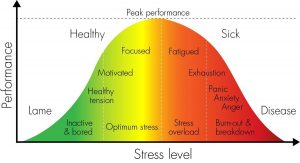
![]()
It is the subjective interpretation of an event by a person. In order to perceive something to be stressful the athlete must:
A situation may be stressful to one person and not another. If there are events that athletes perceive as highly stressful and perceive that they have the ability or resources to cope with it; then it will not have as a profound effect on that athlete. So, having and developing coping skills is paramount in reducing the effects of stress.
Stress can be measured by looking at an athletes “life events” ie; illness, death of a family, situational type circumstances and “daily hassles”. These are the everyday issues such as lots of homework, unexpected daily events, forgetting an appointment, etc. Both have been correlated with a higher incidence of injuries, however the best predictor of the effects of stress on psychological symptoms and illness is daily hassles. Athletes with high coping resources can mitigate the effects of the stressors, though this does not mean they will eliminate the effects.

Stress is a double-edged sword. According to the Yerkes-Dodson Law, an optimal level of stress (arousal) is needed in order to reach peak performance. However, too little stress can lead to under-activation of the athlete (boredom, disinterest), whereas an overwhelming amount of stress can lead to performance anxiety and “distress”. Distress or unmanageable levels of stress lead to higher risks of injury and illness (physical and mental). This is true for both frequency and severity of those injuries. Other effects include:
All of which are ingredients of injuries in the making. Regardless of whether the stressors are real or imaginary, athletes reactions are similar.
Enjoy and have fun with the sport or activity. Parents and coaches frequently place too much emphasis on winning and losing and forget that the primary reason most athletes and participants play is because they enjoy the game. While there is a time and a place for an emphasis on winning and losing, most athletes need to appreciate the experience and friendships made rather than the win-loss record.
Train properly to prepare your body to be able to handle the intensity of the activity. If during practice an athlete trains his body to withstand the intensity of the sport during practice, then the actual contest/game appears less stressful, and athletes feel less pressure during this time.
Focus on the task at hand. Some athletes allow outside problems/distractions to affect their performance. Crowd noise, opponents and hovering parents often cause tremendous stress for an athlete. During the competition, an athlete’s focus needs to be on the responsibilities in the moment, and not outside distractions. Solve the problems and come up with a plan beforehand, or wait until after to help eliminate pressure.
Seek out professional help. Many athletes undergo such high levels of stress and pressure, that they find it helpful to consult with therapists or sports psychologists. These professionals develop specific strategies on an individual basis that focus on problems in performance. Though many of the problems with stress and pressure can be resolved by speaking with teammates, or coaches and parents whom can support them in a positive way.
Expand the Reach is a web based resource for coaches, athletes of all levels, parents and community organizations to support Mental Wellness, and early intervention for better performance in sport & life.